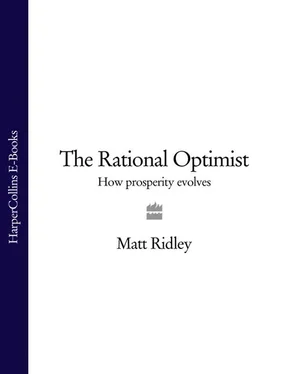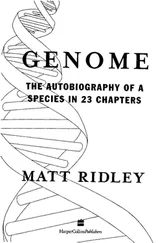Clearly, big brains and language may be necessary for human beings to cope with a life of technological modernity. Clearly, human beings are very good at social learning, indeed compared with even chimpanzees humans are almost obsessively interested in faithful imitation. But big brains and imitation and language are not themselves the explanation of prosperity and progress and poverty. They do not themselves deliver a changing standard of living. Neanderthals had all of these: huge brains, probably complex languages, lots of technology. But they never burst out of their niche. It is my contention that in looking inside our heads, we would be looking in the wrong place to explain this extraordinary capacity for change in the species. It was not something that happened within a brain. It was something that happened between brains. It was a collective phenomenon.
Look again at the hand axe and the mouse. They are both ‘man-made’, but one was made by a single person, the other by hundreds of people, maybe even millions. That is what I mean by collective intelligence. No single person knows how to make a computer mouse. The person who assembled it in the factory did not know how to drill the oil well from which the plastic came, or vice versa. At some point, human intelligence became collective and cumulative in a way that happened to no other animal.
To argue that human nature has not changed, but human culture has, does not mean rejecting evolution – quite the reverse. Humanity is experiencing an extraordinary burst of evolutionary change, driven by good old-fashioned Darwinian natural selection. But it is selection among ideas, not among genes. The habitat in which these ideas reside consists of human brains. This notion has been trying to surface in the social sciences for a long time. The French sociologist Gabriel Tarde wrote in 1888: ‘ We may call it social evolution when an invention quietly spreads through imitation.’ The Austrian economist Friedrich Hayek wrote in the 1960s that in social evolution the decisive factor is ‘ selection by imitation of successful institutions and habits’. The evolutionary biologist Richard Dawkins in 1976 coined the term ‘meme’ for a unit of cultural imitation. The economist Richard Nelson in the 1980s proposed that whole economies evolve by natural selection.
This is what I mean when I talk of cultural evolution: at some point before 100,000 years ago culture itself began to evolve in a way that it never did in any other species – that is, to replicate, mutate, compete, select and accumulate – somewhat as genes had been doing for billions of years. Just like natural selection cumulatively building an eye bit by bit, so cultural evolution in human beings could cumulatively build a culture or a camera. Chimpanzees may teach each other how to spear bushbabies with sharpened sticks, and killer whales may teach each other how to snatch sea lions off beaches, but only human beings have the cumulative culture that goes into the design of a loaf of bread or a concerto.
Yes, but why? Why us and not killer whales? To say that people have cultural evolution is neither very original nor very helpful. Imitation and learning are not themselves enough, however richly and ingeniously they are practised, to explain why human beings began changing in this unique way. Something else is necessary; something that human beings have and killer whales do not. The answer, I believe, is that at some point in human history, ideas began to meet and mate, to have sex with each other.
Let me explain. Sex is what makes biological evolution cumulative, because it brings together the genes of different individuals. A mutation that occurs in one creature can therefore join forces with a mutation that occurs in another. The analogy is most explicit in bacteria, which trade genes without replicating at the same time – hence their ability to acquire immunity to antibiotics from other species. If microbes had not begun swapping genes a few billion years ago, and animals had not continued doing so through sex, all the genes that make eyes could never have got together in one animal; nor the genes to make legs or nerves or brains. Each mutation would have remained isolated in its own lineage, unable to discover the joys of synergy. Think, in cartoon terms, of one fish evolving a nascent lung, another nascent limbs and neither getting out on land. Evolution can happen without sex; but it is far, far slower.
And so it is with culture. If culture consisted simply of learning habits from others, it would soon stagnate. For culture to turn cumulative, ideas needed to meet and mate. The ‘cross-fertilisation of ideas’ is a cliché, but one with unintentional fecundity. ‘To create is to recombine’ said the molecular biologist François Jacob. Imagine if the man who invented the railway and the man who invented the locomotive could never meet or speak to each other, even through third parties. Paper and the printing press, the internet and the mobile phone, coal and turbines, copper and tin, the wheel and steel, software and hardware. I shall argue that there was a point in human prehistory when big-brained, cultural, learning people for the first time began to exchange things with each other, and that once they started doing so, culture suddenly became cumulative, and the great headlong experiment of human economic ‘progress’ began. Exchange is to cultural evolution as sex is to biological evolution.
By exchanging, human beings discovered ‘the division of labour’, the specialisation of efforts and talents for mutual gain. It would at first have seemed an insignificant thing, missed by passing primatologists had they driven their time machines to the moment when it was just starting. It would have seemed much less interesting than the ecology, hierarchy and superstitions of the species. But some ape-men had begun exchanging food or tools with others in such a way that both partners to the exchange were better off, and both were becoming more specialised.
Specialisation encouraged innovation, because it encouraged the investment of time in a tool-making tool. That saved time, and prosperity is simply time saved, which is proportional to the division of labour. The more human beings diversified as consumers and specialised as producers, and the more they then exchanged, the better off they have been, are and will be. And the good news is that there is no inevitable end to this process. The more people are drawn into the global division of labour, the more people can specialise and exchange, the wealthier we will all be. Moreover, along the way there is no reason we cannot solve the problems that beset us, of economic crashes, population explosions, climate change and terrorism, of poverty, AIDS, depression and obesity. It will not be easy, but it is perfectly possible, indeed probable, that in the year 2110, a century after this book is published, humanity will be much, much better off than it is today, and so will the ecology of the planet it inhabits. This book dares the human race to embrace change, to be rationally optimistic and thereby to strive for the betterment of humankind and the world it inhabits.
Some will say that I am merely restating what Adam Smith said in 1776. But much has happened since Adam Smith to change, challenge, adjust and amplify his insight. He did not realise, for instance, that he was living through the early stages of an industrial revolution. I cannot hope to match Smith’s genius as an individual, but I have one great advantage over him – I can read his book. Smith’s own insight has mated with others since his day.
Moreover, I find myself continually surprised by how few people think about the problem of tumultuous cultural change. I find the world is full of people who think that their dependence on others is decreasing, or that they would be better off if they were more self-sufficient, or that technological progress has brought no improvement in the standard of living, or that the world is steadily deteriorating, or that the exchange of things and ideas is a superfluous irrelevance. And I find a deep incuriosity among trained economists – of which I am not one – about defining what prosperity is and why it happened to their species. So I thought I would satisfy my own curiosity by writing this book.
Читать дальше












